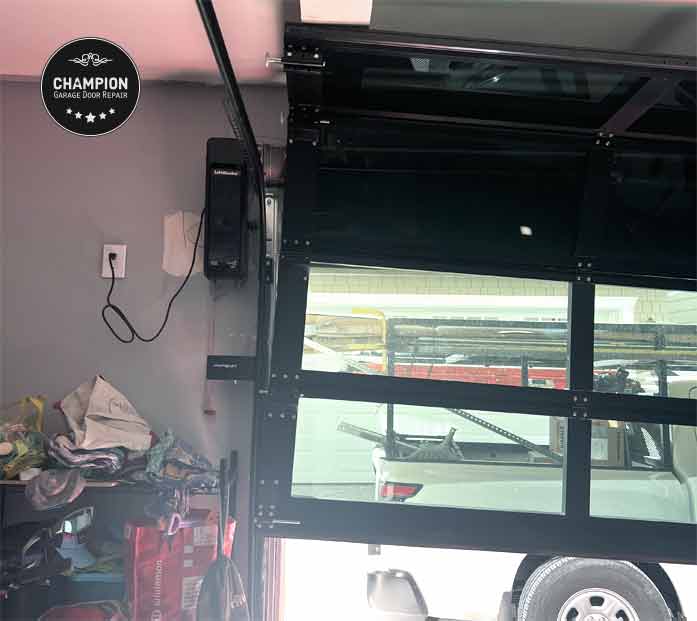Repairing or fixing a garage door refers to the process of restoring a damaged or malfunctioning overhead door systems to its proper working condition. The process involves troubleshooting, identifying and addressing any faults or problems with the garage door and its mechanical components, and includes replacing broken parts and hardware, balancing or calibrating the springs, aligning tracks or equipment, and adjusting the settings to optimize performance. The process of repairing a garage door typically requires a combination of diagnostic skills, technical knowledge, manual dexterity, and the ability to perform physical tasks in harsh environments.
Garage door repair technician – job description and training
A garage door repair technician (or mechanic) is a skilled professional who specializes in the maintenance, repair, and servicing of overhead garage doors. Garage door mechanics often know how to work with a variety of overhead door systems, including sectional, roll-up, tilt-up (or swing-up), and are responsible for diagnosing and fixing any mechanical or electrical problems.
The nature of the work can vary depending on the specific job. The working conditions also vary widely depending on a number of factors, including the location, type of service, and the specific role and responsibilities of the technician. Generally, however, garage door repair technicians work in fast-paced and high-pressure environments where they are required to respond quickly to same day service requests and emergency situations.
The technicians may be called upon to work in challenging or hazardous conditions such as perform repairs in extreme temperatures, work at height, work in confined or cramped spaces, manually handle springs that generate high torque, manually handle heavy equipment and heavy doors that came undone or fell off the tracks.

Although veteran repair technicians can also install or replace complete garage doors and vice versa, repair work is often performed by a specialized technician as the role is focused on a particular area of expertise, which often involve different tasks, responsibilities, functions within a company, and require significant training and experience to acquire the necessary skills. Repair technicians generally perform tasks such as:
- Diagnosing and repairing problems with springs, torsion assemblies, tracks, bearings, rollers, automatic openers, and other garage door mechanical components.
- Performing routine maintenance tasks such as safety inspections, equipment testing, balancing, and tune-ups.
- Interacting with customers to discuss the nature of the problem, the recommended solution, and the cost of the repair.
Proper repair of a garage door often requires the technician to utilize a systematic approach, starting with a thorough inspection of the overhead door system to identify the source of the problem. Once the issue has been diagnosed, the repair process may involve disassembling the equipment to access the damaged components, replacing or repairing these components, and then reassembling the equipment to test its functionality. This may require the use of specialized tools or equipment, as well as the ability to follow detailed instructions or repair manuals.
Becoming a garage door repair technician
There are several ways to learn about garage door repair work as well as the door’s function and mechanics, including apprenticeship programs and taking classes. The choice between working as an apprentice and taking classes depends on the individual’s learning style, career goals, and personal circumstances.
An apprenticeship involves working under the guidance of a skilled and licensed garage door repair contractor. The apprentice typically learns through hands-on experience and observation, gradually developing the necessary technical skills and knowledge to become a skilled garage door repair mechanic themselves.
Taking classes, on the other hand, involves enrolling in a formal educational program, either in-person or online. Classes may cover a wide range of topics and are typically led by instructors who are experts in their field. Students learn through lectures and discussions, and may have opportunities for hands-on experience through laboratory work, internships or experimenting with their own equipment.
To become a licensed garage door repair mechanic, individuals typically need to have a satisfactory and verified experience, undergo background checks, and pass the required regulatory examinations. Ongoing education and training are often required to stay up-to-date with new technologies and advancements in the garage door industry.
The salary of an employed garage door repair technician can vary depending on a number of factors, including their level of experience, location, and the type of employer they work for. The U.S. Bureau of Labor Statistics reported that the median hourly wage is $21.88, and a median annual wage of $45,520. This means that half of all garage door repair mechanics earned more than this amount, while half earned less. The lowest 10 percent of the technicians earned less than $29,780 per year, while the highest 10 percent earned more than $61,400 per year.
What risks garage door repair technicians face on the Job?
Technicians face a variety of risks on the job, both physical and environmental, that can potentially result in injuries, illnesses, or even fatalities. These risks can arise from several factors, including the type of service, the equipment used, the work environment, and the presence of hazardous conditions. Some of the most common risks that garage door repair technicians face on the job include:
- Falls: Technicians are required to work at heights. While most residential garage doors are only 7’ high, other can be 8’, 10’ or even 12’ high. Falls from these heights can result in serious injuries or even death.
- Electrocution: Technicians may come into contact with live electrical wires or equipment, which can result in electrocution.
- Struck by objects: Technicians may be hit by falling objects, such as tools, door sections, or equipment, which can cause serious injury.
- Equipment malfunctions: The use of equipment and power tools such as cutters, reciprocating saws and nail guns can result in accidents due to malfunctions or improper use.
- Overexertion: Technicians work often involves manual labor, such as lifting heavy equipment, which can result in strains, sprains, back problems and other injuries.
- Heat stress: Most garages aren’t ventilated which exposes technicians to high temperatures and humidity. This can cause heat stress, dehydration, and heatstroke.
- Cold stress: Cold weather can also pose a risk to garage door repair technicians, resulting in hypothermia, frostbite, and other cold-related illnesses.
- Noise exposure: Technicians are often exposed to noise due to the use of power tools, which can lead to hearing damage and loss.
- Biological hazards: Technicians may also expose workers to biological hazards, such as mold, bacteria, viruses, mosquitoes and spiders, which can cause illnesses.
To mitigate these risks, garage door repair companies and technicians can take several measures, such as providing proper training, using appropriate personal protective equipment (PPE), maintaining equipment and tools, and ensuring safe work practices are followed at all times. OSHA regulations also require companies to take appropriate measures to prevent accidents and injuries.
What are common repairs that technicians encounter on the job?
Garage door repair technicians encounter a wide range of problems and breakdowns on the job, ranging from minor issues to complex and difficult-to-diagnose problems. Here are some of the most common problems that technicians encounter on the job:
- Opener and motor problems: Garage door opener problems can range from minor issues like adjustment or recalibration to more complex error codes or problems like low resistance and broken components. Technicians need to be able to properly diagnose the root cause of the problem and fix it accordingly.
- Electrical issues: Electrical problems are one of the most common issues that garage door technicians encounter. This can include malfunctioning circuit boards, sensors, or wiring issues.
- Balance problems: Springs and torsion assembly issues can cause a garage door to operate poorly. Balance problems can cause the following issues: garage door won’t close, won’t open, worn-out rollers and bearings, worn-out gears or sprocket, and off-track breakdowns. Technicians need to be able to properly diagnose the issue and determine when to replace the springs and when recalibration is sufficed.
- Broken spring: Broken spring problems can be a major safety issue, and technicians must take proper safety precautions when handling garage door springs. Technicians need to be able to take accurate measurements to determine the proper spring rate.
- Off-track and cables problems: Off track and cables problems can range from minor breakdowns like a single roller that fell off the tracks to more complex problems like a broken cable and complete sections that fell off the tracks. Technicians also need to determine the root cause of the problem to prevent recurrence of breakdowns.
To diagnose and fix these problems, garage door repair technicians need a wide range of skills and expertise, including technical knowledge, problem-solving skills, attention to detail, understanding diagnostic manuals, communication skills, physical dexterity, time management skills, and a commitment to ongoing education.
Repairing a garage door can be a challenging and rewarding for those with an interest in doors, a desire to work with their hands, interact with clients and new customers, as well as willingness to adapt to changing technologies and repair techniques.








